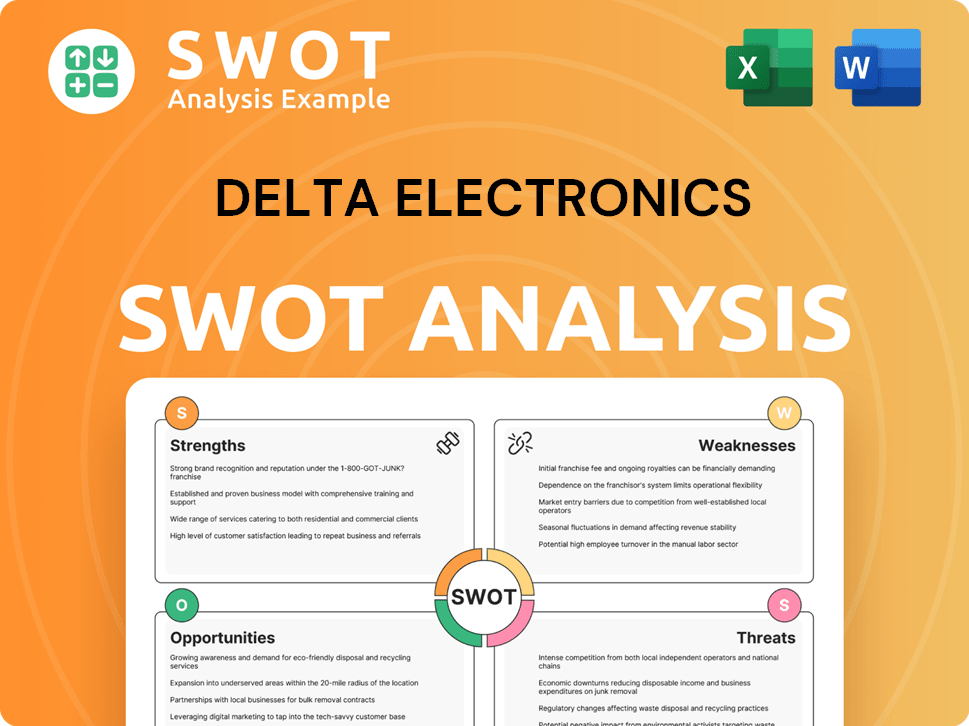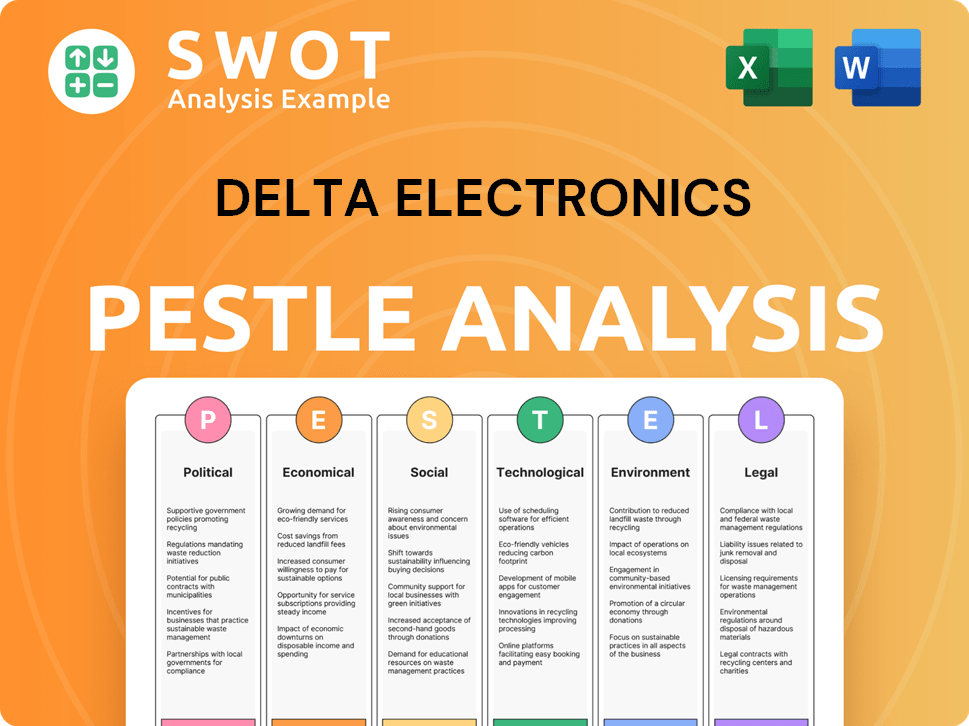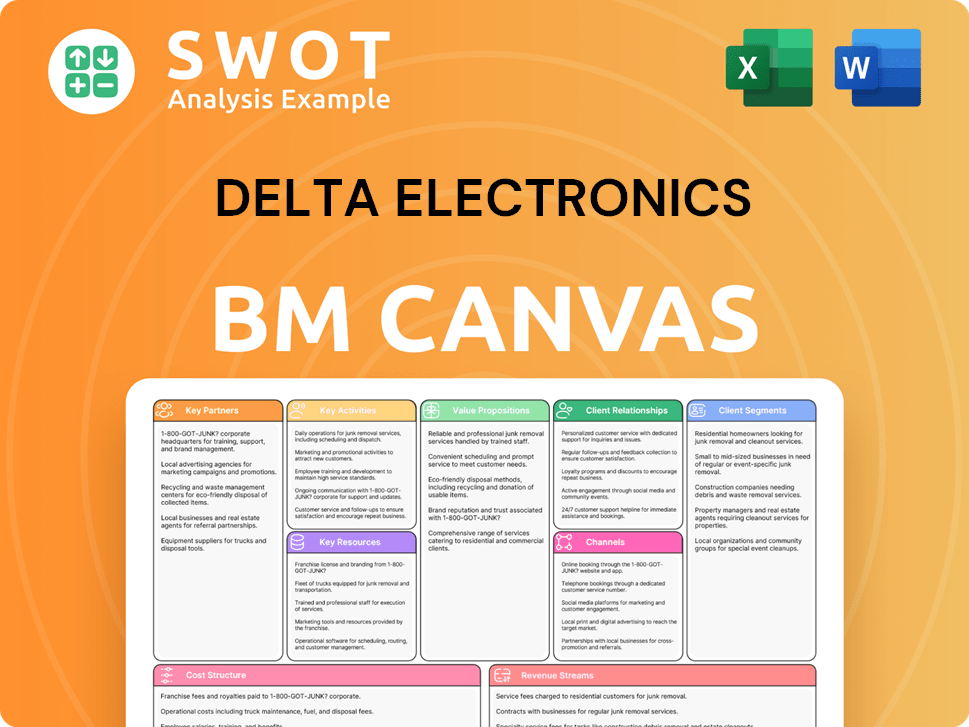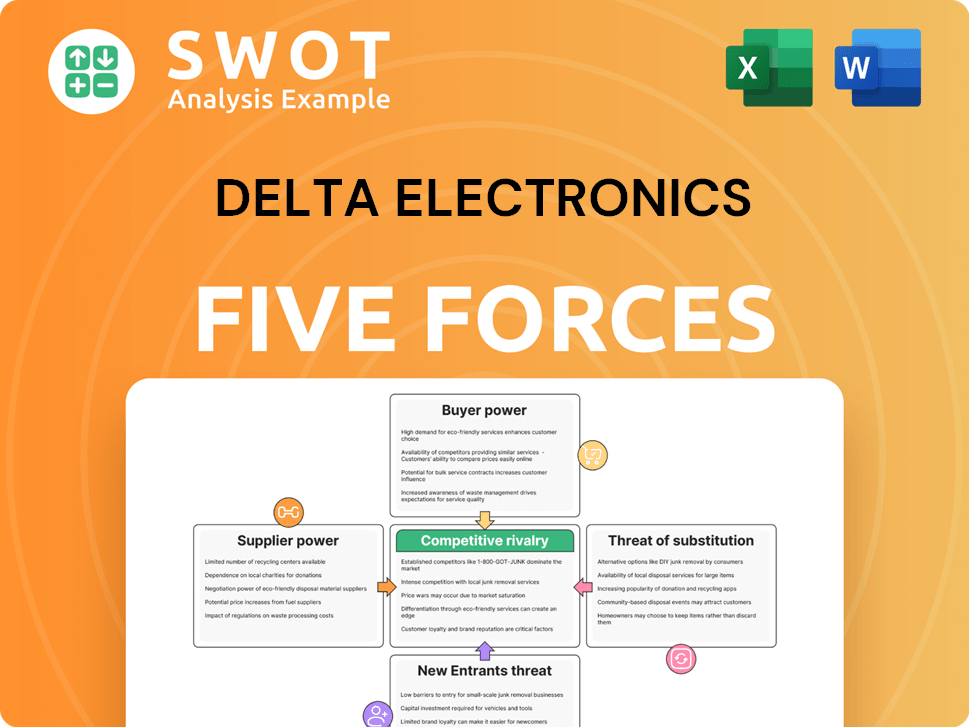Delta Electronics Bundle
How has Delta Electronics Transformed the Tech World?
Delta Electronics, a Taiwanese electronics manufacturer, stands as a testament to innovation and strategic foresight. From its inception, the Delta Electronics SWOT Analysis reveals a company built on a foundation of efficient power solutions, a vision that has driven its evolution. This brief history of Delta Electronics explores how a focus on power supplies propelled it to global prominence.

Founded in 1971, Delta Group's journey from a power supply company to a diversified technology leader is remarkable. The company's early emphasis on energy efficiency positioned it perfectly for the evolving demands of the electronics market. This article will delve into the key milestones and innovations that have shaped Delta Electronics' impressive trajectory, examining its impact on industrial automation and the renewable energy sector.
What is the Delta Electronics Founding Story?
The story of Delta Electronics, a prominent player in the global electronics industry, began on April 1, 1971, in Taiwan. Bruce Cheng, an electrical engineering graduate, established the company with a clear vision: to provide high-quality and efficient power supplies. This marked the genesis of what would become a significant Taiwanese electronics manufacturer.
Cheng identified an opportunity to improve the reliability and efficiency of power components in the burgeoning electronics market. The initial focus was on manufacturing power supplies for televisions and other consumer electronics. This strategic move set the stage for Delta's future growth and innovation in the power supply sector.
Delta's early days were characterized by bootstrapping, relying on Cheng's personal funds and small loans. The name 'Delta' was chosen to symbolize stability and strength, reflecting the founder's aspirations for the company's products and its long-term vision. The company's establishment was supported by Taiwan's emerging industrial landscape, which emphasized manufacturing and export.
Delta Electronics was founded in 1971 by Bruce Cheng, an electrical engineer.
- The company initially focused on power supplies for consumer electronics.
- The name 'Delta' was chosen to represent stability and strength.
- Delta benefited from Taiwan's strong manufacturing and export focus.
Delta Electronics SWOT Analysis
- Complete SWOT Breakdown
- Fully Customizable
- Editable in Excel & Word
- Professional Formatting
- Investor-Ready Format

What Drove the Early Growth of Delta Electronics?
The early years of Delta Electronics were marked by significant expansion in both product offerings and market presence. Initially focused on power supplies, the company quickly diversified into areas like personal computers and industrial applications. This strategic move was crucial, especially with the rapid growth of the IT sector, and it helped establish Delta as a reliable supplier. The company's early success was built on strong relationships with major computer manufacturers, which helped cement its reputation.
In the 1980s, the Taiwanese electronics manufacturer Delta expanded beyond consumer electronics. They ventured into power components for PCs and industrial applications. This diversification was a direct response to the growth of the IT industry, allowing the company to tap into new markets and opportunities.
Early clients included leading computer manufacturers. This early success helped establish Delta's reputation for quality and reliability. The company's ability to meet the demands of these major players solidified its position in the market. This was a key factor in its early success.
The company established its first manufacturing facility outside Taiwan in Thailand in 1988. This marked a significant step into international markets. This move was a crucial step in Delta's global expansion strategy, allowing it to better serve international clients.
In the 1990s, the Delta Group expanded its geographical reach further. The company focused on establishing a presence in Europe and the Americas. This expansion was supported by an increasing global awareness of energy conservation, which aligned well with Delta's emphasis on efficiency.
Delta Electronics PESTLE Analysis
- Covers All 6 PESTLE Categories
- No Research Needed – Save Hours of Work
- Built by Experts, Trusted by Consultants
- Instant Download, Ready to Use
- 100% Editable, Fully Customizable

What are the key Milestones in Delta Electronics history?
Throughout its history, Delta Electronics has achieved numerous key milestones, solidifying its position as a leading Taiwanese electronics manufacturer. These achievements reflect its growth and influence in the global market, showcasing its adaptability and forward-thinking approach.
| Year | Milestone |
|---|---|
| 1971 | Founded as a power supply company, marking the beginning of its journey in the electronics industry. |
| 1990s | Expanded its operations globally, establishing manufacturing locations and offices worldwide. |
| 2000s | Increased focus on renewable energy and energy-efficient solutions, aligning with sustainability initiatives. |
| 2010s | Expanded into electric vehicle charging solutions and smart city technologies, diversifying its product range. |
| 2023 | Reported revenue of approximately $10.8 billion USD, demonstrating strong financial performance. |
Delta has consistently demonstrated innovation, particularly in power electronics and industrial automation. The company's commitment to research and development has led to numerous patents and advancements in energy efficiency.
Early adoption and continuous improvement of switching power supply technology, enhancing energy efficiency across industries.
Securing numerous patents in power electronics, thermal management, and renewable energy technologies.
Developing and implementing solutions for solar inverters and energy storage systems, contributing to the renewable energy sector.
Advancements in industrial automation, including programmable logic controllers (PLCs) and human-machine interfaces (HMIs).
Development of electric vehicle (EV) charging solutions, including DC fast chargers and AC chargers, supporting the growth of the EV market.
Expansion into smart city solutions, including building automation and energy management systems.
The
Navigating economic recessions and financial crises, such as the Asian financial crisis, which impacted market demand and profitability.
Facing competition from both established players and emerging manufacturers, requiring continuous innovation and cost optimization.
Adapting to rapid technological advancements and shifts in market trends, requiring strategic re-evaluations and product adjustments.
Managing supply chain disruptions, including component shortages and logistical challenges, impacting production and delivery schedules.
Addressing geopolitical risks and trade tensions, which can affect market access and operational costs.
Responding to evolving consumer demand and preferences, requiring continuous innovation in product design and features.
Delta Electronics Business Model Canvas
- Complete 9-Block Business Model Canvas
- Effortlessly Communicate Your Business Strategy
- Investor-Ready BMC Format
- 100% Editable and Customizable
- Clear and Structured Layout

What is the Timeline of Key Events for Delta Electronics?
The history of Delta Electronics, a prominent Taiwanese electronics manufacturer, showcases a remarkable journey of growth and diversification. From its inception in 1971, the company has consistently evolved, expanding its product range and global footprint. Initially focused on power supplies, Delta quickly adapted to the changing technological landscape, venturing into industrial automation, renewable energy, and electric vehicle charging solutions. This strategic agility, combined with a commitment to innovation, has positioned Delta as a key player in several high-growth markets. To understand more about the company's business model, consider reading this article: Revenue Streams & Business Model of Delta Electronics.
| Year | Key Event |
|---|---|
| 1971 | Founded in Taiwan, marking the beginning of its journey as a power supply company. |
| 1980s | Began manufacturing power supplies for personal computers and industrial applications, expanding its product range. |
| 1988 | Established its first overseas manufacturing plant in Thailand, signifying its global expansion. |
| 1992 | Listed on the Taiwan Stock Exchange, enhancing its financial capabilities. |
| 1999 | Established Delta Energy Systems (Switzerland) AG, entering the telecom power market. |
| 2003 | Entered the renewable energy sector with solar inverter products, diversifying its business. |
| 2008 | Introduced electric vehicle charging solutions, tapping into the growing EV market. |
| 2010 | Launched building automation solutions, expanding into smart building technologies. |
| 2015 | Acquired Energy Systems AS, strengthening its position in telecom power. |
| 2020 | Continued expansion in data center infrastructure and smart manufacturing solutions, focusing on high-growth areas. |
| 2024 | Focused on AI-driven smart energy solutions and EV charging infrastructure, reflecting its commitment to innovation and sustainability. |
Delta Electronics is significantly investing in electric vehicle charging solutions, anticipating substantial market growth. The global EV charging infrastructure market is projected to reach USD 307.3 billion by 2032, presenting a major opportunity. Delta's focus includes developing advanced charging technologies and expanding its charging network to meet the increasing demand for EVs.
The company is heavily investing in smart manufacturing, leveraging AI and IoT to optimize production processes and offer advanced industrial automation solutions. This involves integrating smart technologies to enhance efficiency, reduce costs, and improve overall operational performance. This strategic direction allows Delta to provide more innovative and competitive products.
Delta is expanding its presence in data center infrastructure, aligning with the global trend of digitalization and the increasing demand for data storage and processing. This involves providing efficient and reliable power solutions, cooling systems, and other critical infrastructure components for data centers. This focus supports the growing digital economy.
Delta is committed to expanding its presence in renewable energy systems and smart city solutions, aligning with global sustainability initiatives. This includes developing solar inverters, energy storage systems, and smart grid technologies to promote clean energy. The company's vision is to create smarter, greener solutions for a sustainable future.
Delta Electronics Porter's Five Forces Analysis
- Covers All 5 Competitive Forces in Detail
- Structured for Consultants, Students, and Founders
- 100% Editable in Microsoft Word & Excel
- Instant Digital Download – Use Immediately
- Compatible with Mac & PC – Fully Unlocked

Related Blogs
- What is Competitive Landscape of Delta Electronics Company?
- What is Growth Strategy and Future Prospects of Delta Electronics Company?
- How Does Delta Electronics Company Work?
- What is Sales and Marketing Strategy of Delta Electronics Company?
- What is Brief History of Delta Electronics Company?
- Who Owns Delta Electronics Company?
- What is Customer Demographics and Target Market of Delta Electronics Company?
Disclaimer
All information, articles, and product details provided on this website are for general informational and educational purposes only. We do not claim any ownership over, nor do we intend to infringe upon, any trademarks, copyrights, logos, brand names, or other intellectual property mentioned or depicted on this site. Such intellectual property remains the property of its respective owners, and any references here are made solely for identification or informational purposes, without implying any affiliation, endorsement, or partnership.
We make no representations or warranties, express or implied, regarding the accuracy, completeness, or suitability of any content or products presented. Nothing on this website should be construed as legal, tax, investment, financial, medical, or other professional advice. In addition, no part of this site—including articles or product references—constitutes a solicitation, recommendation, endorsement, advertisement, or offer to buy or sell any securities, franchises, or other financial instruments, particularly in jurisdictions where such activity would be unlawful.
All content is of a general nature and may not address the specific circumstances of any individual or entity. It is not a substitute for professional advice or services. Any actions you take based on the information provided here are strictly at your own risk. You accept full responsibility for any decisions or outcomes arising from your use of this website and agree to release us from any liability in connection with your use of, or reliance upon, the content or products found herein.